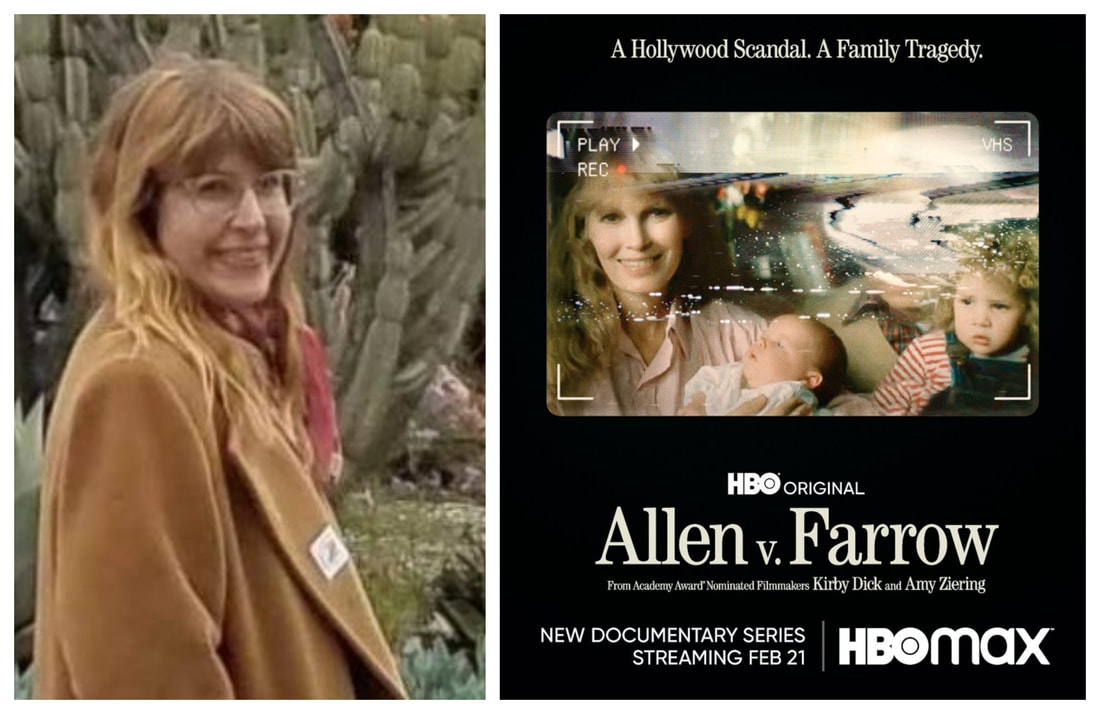|
Amazingly, an article in the New York Times pinpoints the crucial issue underpinning the new docu-series “Allen v. Farrow. That is that women who challenge male authority in any way, but especially when reporting abuse, and even more especially when reporting sexual abuse, a long-existing cultural narrative positions them as “conniving and untrustworthy” i.e. devious liars.
Kudos to journalist Alexis Soloski [pictured] for getting it right. FOLLOWING are excerpts from the article (linked below), but it should be read in its entirety. There are two stories. In one, a father molests his 7-year-old daughter. In the other, a mother coaches that daughter to falsely accuse the father. These stories, one proposed by Mia Farrow and her advocates, one by Woody Allen and his, clearly contradict each other. No sane person can accept both. Crucially, only one lets you feel mostly OK about watching “Annie Hall” again. …In January 1992, Farrow discovered explicit Polaroids that Allen had taken of another of her daughters, her eldest, Soon-Yi Previn, then 21. That August, Dylan Farrow has said, she was abused when Allen was alone with her for perhaps 20 minutes during his visit to Mia Farrow’s home in Connecticut. Concerned by reports from babysitters and by statements that Dylan allegedly made, Farrow took the child to a pediatrician. The pediatrician reported the suspected abuse to law enforcement. Allen sued for custody. A criminal investigation began. The news media chronicled it all with the kind of fervid enthusiasm you mostly see in circus parades. (Allen has consistently denied the accusations.) …The documentary shows evidence supporting Allen, chiefly a report from the Child Sexual Abuse Clinic of the Yale-New Haven Hospital, which concluded that Dylan was either fantasizing or had been coached by her mother. On the other side is the testimony, in court and for the camera, of babysitters, family friends and Dylan herself. The judge in the custody trial ultimately labeled Allen’s behavior “grossly inappropriate.” …But at the arrhythmic heart of the matter were these two stories. Until very recently, the public preferred the one that allowed Allen to keep making movies, movies in which comparatively powerless young women willingly enter into relationships with older, more powerful men. …These stories run a big-haired gamut in terms of individual culpability, but in every case, popular culture found a way to blame the woman, often to excuse a more blameworthy man. …I asked Sarah Marshall, a journalist and a host of “You’re Wrong About,” why popular culture likes to portray women as complicit and deserving of contempt. “It justifies subjugating them,” she said. “If women are randomly taken down for possessing what we see as an alarming degree of power, even if it isn’t, then maybe they’ll be more fearful about how they wield it.” …“I don’t think we were equipped to deal with stories of abuse at that moment,” she said. Now she sees “a larger shift in our apparatus of language to understand and condemn when it comes to abuse,” [Anne Helen Peterson] said. …The “Allen v. Farrow” series, in part because it sides so unequivocally and uncritically with Mia Farrow, will convince some but not all. Still, no matter what did or didn’t happen in that Connecticut crawl space in 1992, and even though we know, or we should know, that child sexual abuse is frighteningly common and that false reports of abuse are rare, there was one story that our culture believed. Here’s how a now adult Dylan Farrow put it in a CBS interview from 2018: “What I don’t understand is how is this crazy story of me being brainwashed and coached more believable than what I’m saying about being sexually assaulted by my father?” How? Because that story reinforces norms of power and control. Because it supports an idea of women as conniving and untrustworthy. Because making women wrong — for their knees, for their autonomy — is what our culture loves to do. And if a woman like Mia Farrow — pretty, successful, comparatively wealthy — could be exposed as a villain, it becomes that much easier to delegitimize the rest of us, particularly women of color, who are more likely to experience sexual violence and less likely to report it. If you believe Allen, his story is a happy one, at least until #MeToo came along and complicated it. He marries [Mia’s adopted daughter] Previn. He makes movie after movie. He even wins another Oscar. If you believe Dylan Farrow, you recognize she grew up knowing that her abuser went unpunished, that his career flourished. That’s a terrible ending. What attitudes would our culture have to sacrifice to imagine a better one? TWC NOTE: The 3rd episode in the series will talk about Family Court involvement in the case. Watch this space for a critique of that. Will they get it right? Or not? Excerpts from: Woody Allen, Mia Farrow and What Popular Culture Wants to Believe The new HBO documentary revisits a 1990s scandal. What viewers take away from it may depend on the stories they trust about women and why. https://www.nytimes.com/2021/03/02/arts/television/woody-allen-mia-farrow-documentary.html?action=click&module=Editors%20Picks&pgtype=Homepage Pictured: Alexis Soloski, author of article
0 Comments
|
AuthorCindy Dumas, M.A. has been researching, writing, and raising awareness about the Custody Crisis since 2003, when she was unable to protect her children from their abusive father. She fled into hiding when Family Court failed her and was tricked into returning home, when her children were given to their abusive father. Archives
January 2022
Categories |

 RSS Feed
RSS Feed